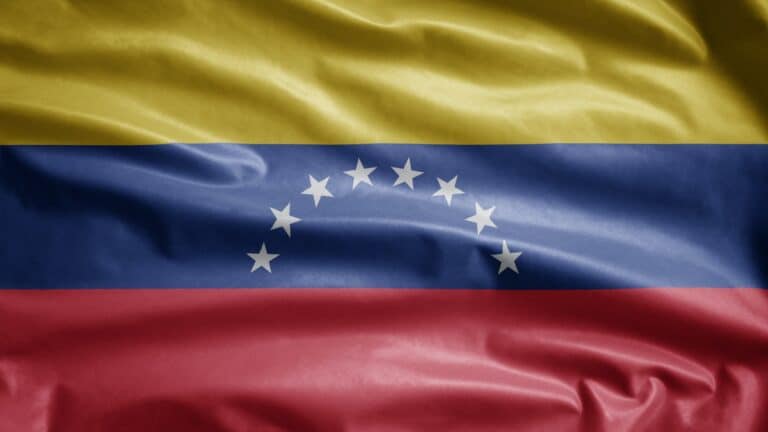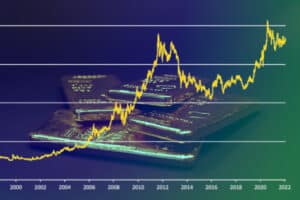A once thriving country in South America, Venezuela now faces hyperinflation, crippling shortages of food and medicine, and millions seeking refuge in other countries. The collapse of the Venezuelan economy is a vivid reminder of the serious consequences that can result from over-dependence on a single industry, uncontrolled government intervention, and rampant corruption.
While it may seem like the U.S. could ever experience something so drastic, it’s important to stay ahead of the curve and protect your wealth. Read on to learn about this drastic downfall and the valuable lessons other countries can use to avoid repeating these mistakes.
Venezuela’s Economic History
Venezuela’s economic history can be characterized by early fortune thanks to oil exports, followed by the rise of Hugo Chávez and socialist policies that led to mismanagement, corruption, and eventual economic decline and collapse.
Early Prosperity
Venezuela’s early prosperity dates back to the early 20th century. Before that, the country struggled with economic problems and was considered one of the poorest countries in Latin America. But the discovery of vast oil reserves opened up new opportunities for Venezuela to experience rapid economic growth and development.
This surge in wealth led to a period of vigorous progress through numerous development projects, the expansion of infrastructure, and the implementation of social programs to improve many Venezuelans’ standard of living.
The government also focused on the needs of low-income families by building affordable housing and investing in education to produce a highly skilled workforce that could contribute to the country’s progress.
These efforts significantly improved the quality of life for many citizens and further strengthened the country’s position.
Rise Of Hugo Chávez And Socialist Policies
Hugo Chávez’s presidency was a turning point in Venezuela’s economic history. The charismatic former military officer excited the public with his vision of a socialist utopia aimed at reducing income inequality and providing a better standard of living for everyone. With his Bolivarian Revolution, he sought to fundamentally transform the country by limiting the private market and significantly expanding the public sector.
During his reign, Chávez implemented various populist measures, such as nationalizing key industries like telecommunications, electricity distribution, and steel production, which he transformed into state-owned enterprises under government control. Chávez also confiscated large tracts of land from private owners for agricultural use or distribution to poor communities.
Despite these efforts to promote socialism in the Venezuelan economy, corruption increased in the newly created government institutions, ultimately exacerbating problems related to resource management and accountability.
The Current State Of Venezuela’s Economy Under President Maduro
Following Chávez’s death in 2013, President Nicolás Maduro has continued the socialist policies Chávez initiated, contributing significantly to the country’s economic turmoil.
Under Maduro’s leadership, the Venezuelan economy has experienced runaway inflation, widespread food and medicine shortages, and a general deterioration in living standards.
Maduro’s government has also been accused of human rights violations and repressing political dissent, leading to international condemnation and economic sanctions. These sanctions have further worsened the crisis by limiting Venezuela’s access to global markets and foreign investments.
Reasons For The Collapse Of The Venezuelan Economy
Hugo Chávez’s socialist policies, coupled with external factors such as fluctuating oil prices, U.S. sanctions, and the government’s response to the crisis, contributed to the weakening and eventual collapse of the Venezuelan economy.
Over-reliance On Oil Exports And Corruption
The Venezuelan economy depended heavily on oil exports, which accounted for nearly 95% of the country’s revenues. However, these revenues were often diverted for personal enrichment instead of being invested in public services or infrastructure.
This over-reliance on a single commodity led to a lack of diversification in key sectors such as health, education, and agriculture and made the country vulnerable to global oil price fluctuations.
When oil prices fell dramatically in 2014, Venezuela was hit hard and struggled to compensate for lost income. The rampant corruption at all levels meant that aid received from international organizations and other countries, unfortunately, didn’t reach those who needed it most.
Economic Sanctions And Political Instability
In 2017, the United States imposed sanctions on Venezuela’s oil industry and state oil company PDVSA in response to corruption and human rights abuse allegations under the Maduro government.
Ongoing political unrest in Venezuela has also contributed significantly to the country’s economic decline. Protests against the government began in 2014 and have since led to violent confrontations between demonstrators and security forces that have disrupted daily life and the overall functioning of the country.
These difficult circumstances, both internal and external, have forced numerous companies to close or relocate abroad. As a result, job losses have worsened, with about a quarter of the Venezuelan population currently without a permanent job.
Impact Of The Collapse On The Venezuelan People
Having explored the reasons for the collapse of the Venezuelan economy, it’s important to examine how this crisis affected the lives of the Venezuelan people. Food and medicine became scarce, crime rates increased, and millions of Venezuelans were forced to flee their homes in search of better opportunities.
Food And Medicine Shortages
The scarcity of basic necessities, such as food and medicine, has become a harsh reality for many Venezuelans. Inflation has reached the point of hyperinflation, making it exceedingly difficult for people to afford even the most fundamental items.
Food shortages have become a widespread problem as people face the daunting task of providing food for themselves and their families. Long lines often form outside supermarkets and grocery stores, where the little food available is often sold at inflated prices.
This situation has forced many Venezuelans to drastically change their diet, eat less, or even go hungry, leading to malnutrition and a deterioration in overall health.
Unfortunately, the health sector has also been hit hard by the crisis, and the Venezuelan Pharmaceutical Association estimates there’s an alarming 85% shortage of medicines in the country. Because of this deficit, it’s nearly impossible for individuals to access medical care when they need it, deepening health problems and putting lives at risk.
Skyrocketing Crime Rates
The dire economic situation has pushed many to the brink, forcing them to engage in criminal activity to provide basic necessities for themselves and their families. With an estimated 73 violent deaths per day, the country has one of the highest murder rates in the world.
Theft is also on the rise as desperate people turn to illegal means to make ends meet. Unfortunately, this rising crime rate can be attributed to the poverty and hunger crisis that affects 82% of the Venezuelan population.
This dwindling sense of security can have long-lasting effects on the country’s social fabric as the struggle for survival tears communities apart.
Massive Emigration
According to the United Nations, more than 5 million Venezuelans have fled their country in search of better economic opportunities and access to daily essentials.
The decision to leave Venezuela is often a difficult one, as it often leads to the separation of families. Parents may leave their children with relatives or friends, hoping to build a more stable life in another country before reuniting with their loved ones. In other cases, entire families embark on the difficult journey together to find safety and stability beyond the borders of their home country.
This large-scale migration has significantly strained neighboring countries struggling to cope with the influx of Venezuelan refugees. These new arrivals often face numerous challenges in their host countries, such as finding employment, accessing health care, and adapting to a new culture and language.
Lessons Learned From Venezuela’s Collapse
The collapse of Venezuela’s economy serves as a cautionary tale for nations around the world. It highlights the importance of diversification and the dangers of unchecked government corruption.
Importance Of Diversification
One of the lessons to be learned from the collapse of the Venezuelan economy is the importance of diversification. For decades, Venezuela relied heavily on its vast oil reserves as its only source of revenue.
Unfortunately, this approach left the economy vulnerable to sudden oil price drops and production fluctuations. Countries that depend on one or two sources of revenue are at high risk if those sources fail or lose value.
Norway is an excellent example of a country that has successfully diversified its economy. By investing the profits from its natural resources in other sectors, Norway has built a strong and resilient economy that can withstand external shocks. This approach has made it one of the wealthiest and most prosperous countries in the world.
Dangers Of Corruption And Political Instability
Corruption within Venezuela’s government has contributed significantly to its economic downfall, with reports of embezzlement, mismanagement of resources, money laundering, and involvement in drug trafficking. These corrupt activities have drained the country’s resources, leaving the government unable to invest in development projects or provide basic services to its citizens.
Additionally, political instability has played a role in the country’s economic decline, with power struggles between different groups leading to social unrest and violence. In order to ensure a stable and profitable future for their citizens, countries need to take effective measures to address these corrupt issues before they get out of control.
Impact Of International Trade And Cooperation
The collapse of the Venezuelan economy is a vivid reminder of the impact that international trade and cooperation can have on a country’s stability. U.S. sanctions against the Venezuelan government and falling oil prices led to a rapid decline in GDP of over 80%.
This led to the breakdown of important trade partnerships that were essential to maintaining a stable economy. While some may argue that such measures are necessary to punish corrupt governments, the impact on ordinary citizens cannot be overlooked.
However, China has continued to invest heavily in Venezuela despite political instability and economic turmoil – a lesson other countries can learn from. These investments have helped stabilize the economy to some degree and have provided a buffer against the negative effects of sanctions and falling oil prices.
Countries need to prioritize trade partnerships and avoid policies that could lead to economic instability and negatively impact their citizens. International sanctions should be used judiciously and target those responsible for corruption rather than punishing ordinary citizens who are already struggling.
Safeguard Your Wealth By Investing In Gold
If you’re looking for an alternative way to protect your assets from market volatility and political instability, investing in precious metals like gold and silver is one of the most popular options among investors worldwide.
Click here to create your account, or call us today at (877) 646-5347 to speak with our team about purchasing precious metals to store at home or in an IRS-approved precious metals IRA.







